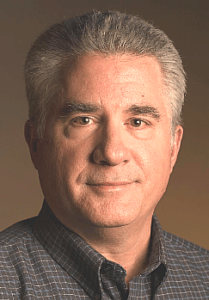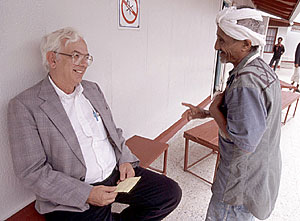“And let us not be weary in well doing,” the Apostle Paul advised in his letter to the Galatians, “for in due season we shall reap, if we faint not.”
Sometimes, well doing may mean just hanging on.
Even Paul, the greatest missionary in church history, was so overwhelmed at one point with the demands of his ministry — and violent opposition to it — that he admitted “we were burdened excessively, beyond our strength, so that we despaired even of life.”

Erich Bridges
Did he have thoughts of suicide? We don’t know. Deep discouragement, for sure. If Paul got that low, we need not be ashamed of struggling to go on from time to time.
Considering the headlines, that seems to be where many of us find ourselves.
Pastors, who have a daunting job in normal times, report battling depression as they try to save their churches from succumbing to pandemic losses and political divisions. “Quiet quitting” and “the Great Resignation” afflict businesses across the land. Anxiety disorders, now the most common mental illness in the United States, affect 40 million adults every year. The government has recommended that every person under age 65 be screened for anxiety and depression.
What’s going on? Life. Death. Change. Upheaval. It could be worse, much worse; consult any history book. But that doesn’t make it easy.
“It could be worse, much worse; consult any history book. But that doesn’t make it easy.”
“Fatigue makes cowards of us all,” goes a famous quote, variously attributed to Gen. George S. Patton and coaching legend Vince Lombardi.
We, or many of us, are tired. Tired of the grind. Tired of toiling and seeing no results. Tired of attacks from foes and endless bickering among those who are supposed to be our friends. Tired of watching our once-vibrant national culture fragment and disintegrate.
In a brave and powerful column, BNG Executive Director Mark Wingfield recently wrote of his personal struggles with depression and what he has learned through therapy. Read it and learn.
In my case, forced retirement from a calling I loved, followed by the loss of my beloved wife to cancer a year later, destroyed much of my sense of identity. Grief, depression, loneliness and isolation almost finished me off. Five years on, I see light at the top of the hill, but only because the Lord has walked beside me, step by step, out of the deepest part of the valley. Medication has helped, too.
“Five years on, I see light at the top of the hill, but only because the Lord has walked beside me, step by step, out of the deepest part of the valley.”
My friend John Dorr, a gifted filmmaker and Southern Baptist “missionary kid,” recently paid tribute to his father, missionary physician David Dorr, who would have been 100 years old Sept. 13.
“Unfortunately, he did not make it past 78, but the impact of his quiet life of serving others with his spiritual and medical gifts continues,” John wrote.
His father’s entire medical ministry unfolded in the Middle East, where few people made open commitments to follow Christ.
“As a high school student, I remember asking my mother what good they were doing in a place that wanted their medical help but rejected their spiritual message,” John recounted. “Her gentle yet wise answer gave me a long view of God’s working in such situations and places: ‘Your father has performed surgery and helped many thousands of people here. Through these gifts, they were touched by the love of God that lives and flows through your father. When they leave and again are confronted, in some other place and time, by the same Spirit of Love, that scar will confirm and bear witness to the one who brought us here — and it may be that their eyes will be open, and they come to know him who loves them so.’”
But I’m sure John’s father wondered more than once — especially in times of exhaustion and discouragement — if he had wasted his life in a spiritual desert.

Bill Koehn at the Jibla Hospital in Yemen.
Bill Koehn, another medical missionary who managed the Jibla Baptist Hospital in Yemen for 28 years, was near despair in 2002. He was preparing to hand over hospital administration to Yemeni government control and openly wondered in conversations with mission colleagues if he had made any spiritual difference at all in the conservative Muslim nation.
Christian witness was rigidly limited to the hospital compound, where Koehn preferred to spend his time anyway, given the heavy responsibilities of running the daily operation.
At its peak, the 77-bed mission hospital employed several hundred workers, treated some 40,000 people a year, performed more than 400 surgeries a month and operated a busy outpatient clinic. For a time, it offered the only public Christian worship service in all of Yemen. Patients included everyone from villagers who had never laid eyes on a doctor to powerful sheikhs and government officials. They knew Jibla offered some of the best — and most compassionate — medical care in Yemen.
Koehn was quiet, predictable, an old-school manager who operated on a strict daily schedule. It enabled him to handle the countless details involved in running the hospital — and deal with the countless crises that threatened it. Yet he somehow found the time to make wooden toys for the orphanage he loved to visit, to assist needy widows in the community, to drink tea with Yemenis and listen to their struggles and needs.
A few days before the scheduled hospital handover, Koehn and two other medical missionaries were shot dead by an Islamic extremist.
Did he make a spiritual difference? Eternity will tell, but the hundreds of grieving Yemenis who came to pay tribute to him indicated he changed many lives.
Sometimes, all we can do is hang on.
If you need medication to make it through, get it. If you need therapy, seek it. I have benefited from both.
But when you get tired, really tired, remember that true rest and renewal come from the Lord: “He gives strength to the weary and increases the power of the weak. Even youths grow tired and weary, and young men stumble and fall; but those who hope in the Lord will renew their strength. They will soar on wings like eagles; they will run and not grow weary, they will walk and not be faint.”
Erich Bridges, a Baptist journalist for more than 40 years, retired in 2016 as global correspondent for the Southern Baptist Convention’s International Mission Board. He lives in Richmond, Va.
Related articles:
What I found hidden in my mother’s Bible after her death | Opinion by Kim Brewer
‘I don’t think I care about anything anymore’: How to be anxious and depressed during the end of the world | Opinion by Eric Minton
Here’s what I’m learning in therapy | Opinion by Mark Wingfield


